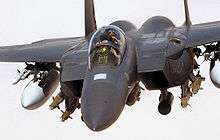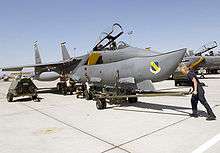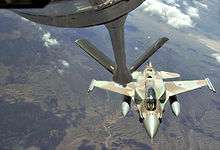Conformal fuel tank
Conformal fuel tanks (CFTs) are additional fuel tanks fitted closely to the profile of an aircraft that extend the endurance of the aircraft. CFTs have a reduced aerodynamic penalty compared to external drop tanks, and do not significantly increase an aircraft's radar cross-section. Another advantage CFTs provide is that they do not occupy ordnance hardpoints like drop tanks, allowing the aircraft to carry its full payload.


Conformal fuel tanks have the disadvantage that, unlike drop tanks, they cannot be discarded in flight, because they are plumbed into the aircraft and so can only be removed on the ground. As a result, they will impose a slight drag-penalty and minor weight gain on the aircraft even when the tanks are empty, without any benefit. They can also impose slight g-load limits, although not always an absolute issue: the CFTs on the F-15E actually allow the same maneuverability without g-limitations and the aircraft features improved flight performance compared to the F-15C due to its more powerful engines.
Examples
Conformal fuel tanks
- F-15C entered service with CFT capability.[1] Initially known as FAST packs (Fuel And Sensor Tactical),[1] each unit carried an additional 750 US gallons (2,839.1 L) of fuel[2], while retaining hardpoints for four AIM-7F Sparrow missiles or bombs, some on the FAST packs.[3] They were first tested on the F-15B in 1974. All U.S. F-15Es, and Strike Eagle export variants such as the Israeli and Singapore models, are fitted with CFTs under the wing[4] outside the engine intake and require modification to fly without them.[5] The FAST pack was originally intended to carry a navigational and targeting infrared sensor system (thus "Fuel And Sensor"); however, the F-15 simply began carrying LANTIRN pods for ground-attack missions instead.[1]

- Export aircraft for Greece, Chile, Israel, Poland, Pakistan, Turkey, Singapore, Morocco, Egypt and the UAE are plumbed for carriage of two CFTs mounted on top of the aircraft near the wing root. Together they hold 450 US gallons (1,703.4 L), 3050lb of fuel.[6][7]
- Mikoyan MiG-29SMT - MiG-29S (Product 9.13)- Mikoyan MiG-35
- The F-CK-1D prototype ("Brave Hawk") and the F-CK-1C single-seater prototype are equipped with the new CFTs. The prototype Indigenous Defence Fighter II “Goshawk” has over-wing CFTs.[13]
- Conformal fuel tanks are mounted above the wings to replace the drag of underwing tanks. Combined, they carry 1,590 kg (3,500 lb) of extra fuel, while adding extra lift and expanding combat radius by 130 nmi (240 km) with a small transonic acceleration penalty.[14][15]
- Conformal fuel tanks were installed on the wingtips.[17]
- WWII:
- Supermarine Spitfire in the belly.
- Messerschmitt Bf 109 in the belly.
- Messerschmitt Bf 110D-1 in the belly - nicknamed Dackelbauch (dachshund's belly).
Distended internal tanks
Distended internal tanks are fuel tanks that create a bulge from the fuselage or are mounted flush with the fuselage.
- English Electric Lightning[18] Conformal ventral store was used for a small or large belly fuel tank which bulges out from the underbody.
- Gloster Javelin fitted with dual flush-mounted belly tanks with a capacity of 1,137 liters (300 US gallons). They were known as "bosom tanks" or "Sabrinas".[19][20]
- Gloster Meteor.[21]
- Shenyang J-6.
- Nanchang Q-5 "Fantan" weapons bay fuel tank extends below the fuselage profile.[22]
References
- Notes
- Joe, Baugher (20 February 2000). "McDonnell F-15C Eagle". JoeBaugher.Com. Retrieved 2010-09-21.
- U.S. AIR FORCE "F-15E Strike Eagle" USAF military website, April 15, 2005.
- Green and Swanborough 1998, p. 371.
- Lambert 1993, p. 521.
- Joe, Baugher (9 May 2004). "McDonnell F-15E Eagle". JoeBaugher. Com. Retrieved 2010-09-21.
- "First phase of flight testing of the F-16 conformal fuel tanks completed".
- "L-M and USAF Complete Flight-Testing of F-16 Conformal Fuel Tanks".
- "Rafale B Fitted with Conformal Fuel Tanks". Airforce-technology.com. Retrieved 2010-11-09.
- https://foxtrotalpha.jalopnik.com/how-america-and-iran-danced-to-the-brink-of-war-1840868986
- https://www.businessinsider.com/russia-just-deployed-its-upgraded-mig-29-to-syria-for-the-first-time-2017-9
- "BAE Systems begins new round of CFT trials for Typhoon".
- Cenciotti, David. "A Typhoon model fitted with conformal fuel tanks" The Aviationist, 22 April 2014.
- Cole, Michael. "Jet deals to keep state-owned firm busy" Taipei Times, 13 August 2011.
- "Boeing Pitches 'Advanced Super Hornet' For Future Threats | Defense News: Aviation International News". ainonline.com. Retrieved 2015-09-03.
- Mizokami, Kyle (February 16, 2018). "The F/A-18 Super Hornet Is About to Fly Farther Than Ever Before". Popular Mechanics.
- "Chinese J-10 Fighter With Conformal Fuel Tanks CFT's In Wind Tunnel Testing - ASIAN DEFENCE NEWS". asian-defence.net. Archived from the original on 2012-07-24. Retrieved 2015-09-03.
- "BAC Strikemaster Strike Aircraft (1967)" page 2 MilitaryFactory, 7/2/2014
- "Thunder & Lightnings - English Electric Lightning - Pictures - Profiles". Thunder-and-lightnings.co.uk. 2009-08-11. Retrieved 2010-11-09.
- "The Gloster Javelin - the full story from concept to service". Archived from the original on 2007-10-27. Retrieved 2015-09-03.
- "Image: xh712.jpg, (800 × 533 px)". thunder-and-lightnings.co.uk. Retrieved 2015-09-03.
- "Meteor2". Aviationmuseum.com.au. 2008-07-19. Archived from the original on 2010-09-20. Retrieved 2010-11-09.
- "Image". SinoDefence.com. Archived from the original on 2010-07-28. Retrieved 2010-11-09.
- Green, William and Gordon Swanborough. The Complete Book of Fighters. New York: Barnes & Noble Inc., 1988. ISBN 0-7607-0904-1.
- Lambert, Mark, ed. Jane's All the World's Aircraft 1993–94. Alexandria, Virginia: Jane's Information Group Inc., 1993. ISBN 0-7106-1066-1.